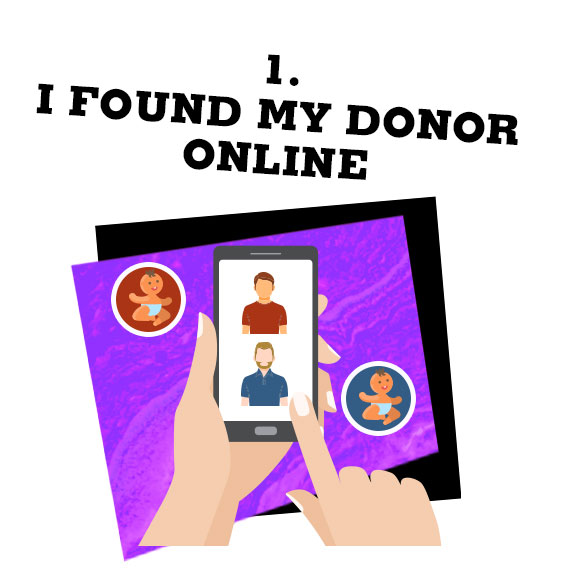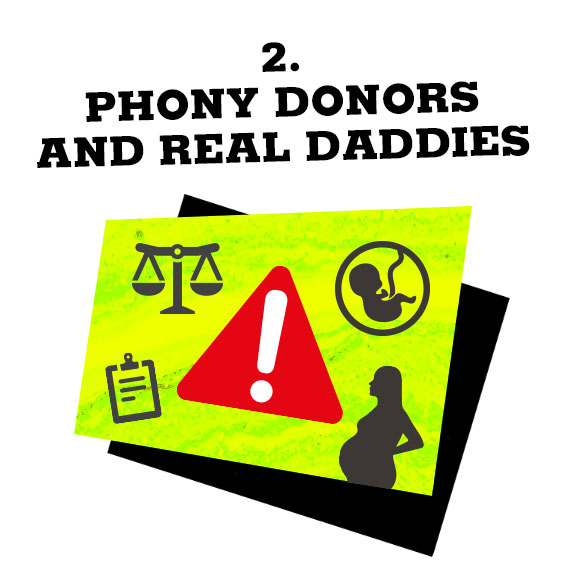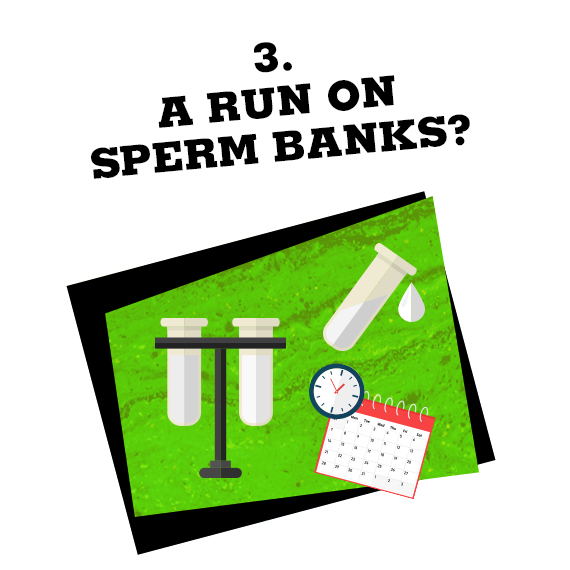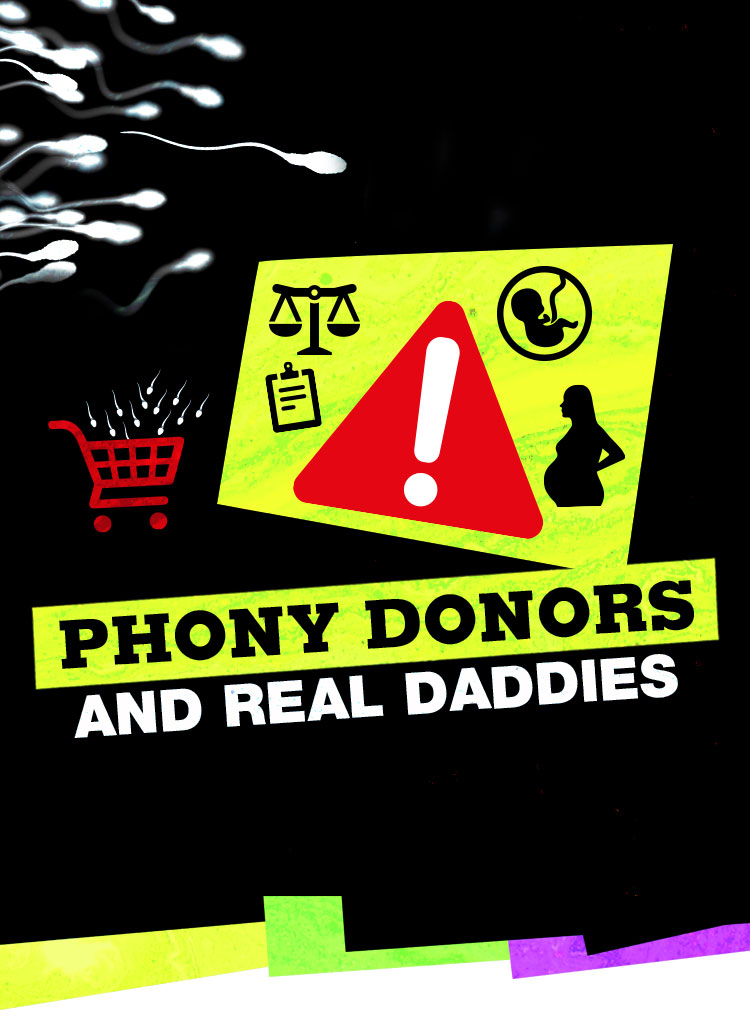Twenty-two-year-old “Louis” from Lille has a Colgate smile and is a gifted tennis player. “Ben”, 34, is an athletic Parisian who runs to stay fit, but also appreciates the arts. And 45-year-old “donneur27” is a cheerful-looking aeronautics engineer from Normandy who touts an excellent fertility rate and a heart-felt desire to help others.
These sperm donors are among 800 profiles that are active on the members-only French Internet forum Donneur Naturel (Natural Donor). The online platform aims to help single women and homosexual couples circumvent France’s laws on medically assisted procreation (MAP), which limit access to fertility treatment to heterosexual couples. It is one of at least a dozen platforms – including websites, Facebook groups, smartphone apps and WhatsApp chats – that fuel a thriving underground market for sperm in France.
“It’s a real problem,” says Nicolas Faget, a spokesperson for the Association of Gay and Lesbian Parents and Future Parents (APGL), estimating that around 5 percent of the association’s female members have found their donors online.
Nicolas Faget
Aside from the danger of letting a stranger into your home, Faget highlights the enormous health risks that selecting a donor from these platforms entails. “You have no idea whether the donor you meet in this type of setting carries any sexually transmitted diseases [STDs],” he says. “And if he does, he’s most likely going to transmit them through his sperm.”
Céline Chalas, a Paris-based doctor who works at France’s state-run sperm bank, CECOS, agrees, pointing to the medical guarantees linked to clinically tested sperm. “Before a donor even starts with us, we test his sperm for HIV, Hepatitis B and C, Syphilis, Herpes and human T-cell lymphotropic virus type 1,” she explains. The trouble, of course, is that CECOS sperm is for heterosexual couples only.
Although the vast majority of online donors claim to be in perfect health, have a high sperm count and offer to provide up-to-date test results, the women have no guarantees that their documents are authentic. And even if they are, some STDs, like HIV, can take weeks before they are detected. This means that if the donor was infected recently, he might not be aware of it. And it might not show in his test results.
Faget says the main reason some women are still willing to take such risks is financial: They simply cannot afford a medically assisted insemination in a foreign country where the procedure is legal for single women and lesbian couples. “It’s a type of discrimination that comes down to money. Treatment in Belgium or Spain can easily cost €10,000 or more,” he says. “It’s clear that most women would choose the safer medically assisted option in a clinic if only they could afford it.”
Anonymous sperm donor
So who are these anonymous donors flooding the internet? And how come they are so willing to give away their semen when France's national sperm bank only registered 363 donors in 2016, the last year for which official figures have been published?
According to one online sperm donor, who requested anonymity for privacy reasons, there are three main categories of donors: “For some, it’s really to help out. For others it’s to get sex and to coerce the women into sex. And for the rest it’s money.”
The donor, who says he belongs to the first category, claims to have fathered dozens of babies and now moderates a 1,100-member closed Facebook group that connects single and lesbian women with donors in France. He says he has seen a clear increase in both the number of donors and the number of women seeking donors on the Facebook group lately. But he has also noted a rise in inappropriate proposals, especially when it comes to donors seeking free sex, or a financial reward for their services.
“Some ask to be paid €30, €500 or even €1,000 for their ‘donations’,” he says, adding that he has to exclude at least 10 people from the group each month because of such demands.
Sperm donor ‘Jack’
Once a woman has selected her donor online, there are three ways to carry out the insemination. Most opt for artificial insemination (AI), in which the donor collects his sperm in a small container and the woman uses a needleless syringe, a turkey baster or a pipette to inject the semen into her vagina. One alternative is partial insemination (PI), which involves penetration just before ejaculation. The other is natural insemination (NI) – in other words, sex.
The AI method, which entails “handling” the sperm but remains the least intrusive for the woman, is strictly forbidden in France and carries a penalty of up to two years in prison and a €30,000 fine. “By handling the sperm, we’re talking three things: collecting it, retaining it and finally manipulating it with one’s hands [by way of a syringe, for example],” APGL’s Faget explains.
For the purpose of this investigation, FRANCE 24’s reporter set up a profile on a popular donor app. Within 48 hours she had received more than 50 “likes” and invitations to start a conversation with potential donors. Most of them advocated natural insemination as their preferred method, with many even conditioning their donation to its use. Offering his reasons, “Joe”, 28, wrote: “I just believe this is how it should be done, it’s more effective too.”
“Jack”, 35, said he would only be prepared to donate through NI and that it would be done “over a timespan of seven to nine days in a row (to make sure you get pregnant), as both bodies are physical and [generate the] chemicals that are needed for a successful fertilisation: It’s a dance for two to make three ☺.” He also said that he was “very interested in helping out lesbian couples and getting them both pregnant in the same cycle”.
“Bebeaide” (or Babyhelp in English), 42, who claims to have impregnated at least five women in the Paris region, initially told FRANCE 24’s reporter that he did not mind donating via the less intimate AI technique, but later told her that it would be a shame to not at least attempt partial insemination because it “maximises the chances” of getting pregnant. “It would just entail sexual intercourse at ‘the moment of’, no strings attached, no foreplay. Your partner can participate in the act,” he proposed.
According to Doctor Chalas, there is some truth to the claim that sexual intercourse works better, however disturbing the propositions. “The conception rate from sexual intercourse is around 25 percent, and 21 percent from a medically assisted intrauterine insemination with frozen donor sperm – so those two methods are comparable,” she says. “But an artificial insemination carried out at home is a lot less efficient, with a conception rate of around 10 percent.”
Nathalie
Even when the insemination is successful, further trials may lie in wait. While donors face potential lawsuits for child support or other parental obligations, the women live with the threat of the donor one day changing his mind and deciding to claim fatherhood – or worse, custody.
Securing parental rights is particularly difficult for a non-biological lesbian mother, who must first adopt the child. It’s a process that involves a mountain of paperwork, requires her to be married to her partner and typically stretches over several years.
Nathalie*, 42, says she went through a “living hell” after her partner’s donor suddenly announced that he was going to claim parental rights to the couple’s child.
“We wanted to have a donor we knew, and so we asked a [gay] acquaintance of my partner,” Nathalie recounts. “He had never demonstrated any desire to have kids, and right away he told us he was happy to help us out. But when my partner was six months pregnant, he suddenly contacted us and said: ‘I’m sorry girls, but I’ve changed my mind and I’m going to recognise the child’.”
Nathalie
The announcement came as a complete shock for the couple. Before the child was even born, the donor had hired a lawyer and launched legal proceedings to have the baby recognised as his own. Nathalie, who was yet to start filling out adoption papers, felt her chances of becoming the second legal parent had all but vanished. The trio would spend the next four years battling it out in French courts. In the end, Nathalie won some parental rights – but so did the father, along with partial custody.
“Looking back, it’s clear we were too naïve regarding his real intentions,” she says. “His willingness to help us out came all too readily, because he actually wanted a child all along. He tricked us, and basically just waited for the six-month mark to tell us, so that we couldn’t go back on the pregnancy.”
The dispute weighed immensely on Nathalie’s relationship and the two women eventually parted ways. “For four years we couldn’t think about anything else. It tore us apart,” she recalls. “In hindsight, I would definitely have done things differently.”
*Names have been changed




